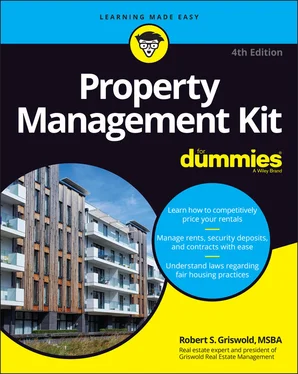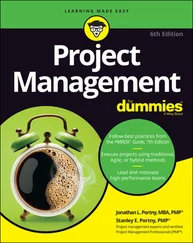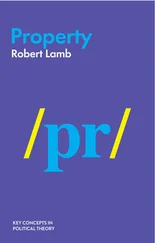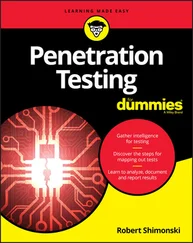Property management can be a rewarding and enjoyable venture. I can’t imagine my life without some aspect of property management in it. (Why else would I have written this book, right?) Following are some of the reasons why I get such a kick out of this business:
Experience with real estate investment: As you manage residential rental property, you have the opportunity to observe and begin to understand investing cycles, which is an essential skill for becoming a successful real estate investor. Some real estate investors succeed without ever being hands-on property managers, of course, because they hire others to handle the task for them. But I believe residential rental property owners should gain that real estate investment expertise by actively working as property managers for several years, either for themselves or others.
Interaction with different people: If you’re a people person, you’ll find that property management is a great opportunity to meet all types of people. Not everyone you’ll encounter is someone you’ll want to make your close friend, but you’ll certainly have the chance to work with a smorgasbord of personalities. I could write a book just about the people I have met over the past 40 years!
Skill development: Property management requires diverse skills because you must handle so many different tasks (such as marketing, advertising, leasing, screening, and maintenance). But it also allows you to grow those skills beyond the basics through patience and passion. You might begin by advertising your rental unit in a basic way with an onsite sign and move to developing a technologically advanced online promotional campaign with 3D property tours available worldwide. Pay attention to how unrelated products are presented for sale, and apply those concepts to residential rental housing. Most of the best marketing ideas are already out there; you just need to adapt them to your rental property.
Variety: Personally, I enjoy the variety of tasks and challenges in property management. Sure, some aspects are repetitious. Rent is due every month, and all properties require ongoing care and maintenance. And some days can be exhausting. But for the most part, every day in property management is something new.
Confronting the icky parts
You can’t expect all aspects of property management to be fun. As in your primary job, some days run smoothly, and others are filled with problems. Here are a few of the most challenging aspects of the property manager gig:
Difficult tenants (and others): Despite the great people you meet, property management has its fill of difficult and challenging personalities, including people who’re downright mean and unpleasant. You have to be prepared for adversarial and confrontational relationships. Collecting the rent from a delinquent tenant, listening to questionable excuses, or demanding that a contractor come back and do the job properly requires patience, persistence, and a fair but firm approach.
Long hours: Because you’re dealing with housing, you don’t know when you’re going to be needed — at 3 p.m. or 3 a.m. Like me, you can expect to be constantly on call — even when you’re on vacation, at the movies, or in the middle of a family holiday dinner — to deal with issues that only the rental owner or property manager can handle. Fortunately, you can minimize these inconveniences by planning carefully and hiring competent, reliable employees and vendors who can prevent many unexpected emergencies through good management and maintenance. Also, technology has improved significantly and can make remote handling of many issues more manageable. You can now receive and review photos and even repair proposals on your smartphone, for example. But owning and managing rental property remains a 24/7, year-round commitment.
Need for emergency capital: One of my favorite sayings and goals in life is “No surprises,” but owning residential rental properties can lead to situations in which unanticipated expenses arise at any time. Tenants might suddenly stop paying rent at the same time the roof leaks and the water heater goes out in the middle of the night! Having a nice nest egg, a rainy-day fund, or at least a decent unsecured credit line at reasonable rates can be very helpful, as most rental property owners experience a squeeze on their cash flow at times.
Potential liability: After more than 40 years in property management, I believe that most tenants are good people who are just looking for a decent, quiet place to call home. But some “professional tenants” look for any mistakes you make or even set traps for you to fall into that can lead to claims for free rent or even litigation. You need to stay on top of all the legal requirements for landlords in your area and make sure that you always comply with all laws and disclosures. If you’re not willing or able to keep up with ever-changing legal requirements and health and safety issues, or if you’re sloppy with your record-keeping, you may learn some expensive lessons!
RENTERS DRIVE RENTAL PROPERTY MANAGEMENT
The U.S. Census Bureau reports that more than one-third of the U.S. population, or 94 million people, are renters occupying more than 43 million rental units, including more than 14 million single-family-home rental properties. The number of renters has increased in the past few years, with the COVID-related economic challenges in most areas of the country. Also, job-market uncertainty has made it more difficult for some people to become homeowners, and the overall percentage of home ownership has fallen from a high of 69 percent in 2006 to 65 percent in early 2021.
Individual property owners dominate the rental housing industry. According to the National Multi Housing Council, per the U.S. Department of Housing and Urban Development and the Census Bureau 2020 survey, individuals own nearly 72 percent of small rental properties with 2 to 4 units and nearly 23 percent of residential income properties with 5 to 49 units. The majority of residential rental properties of all sizes in the United States are owned by single-purpose legal entities, such as limited liability companies (LLCs), limited partnerships (LPs), limited liability partnerships (LLPs), and general partnerships, which often are individuals or a small number of investors pooling their resources. By comparison, one of the most popular ways for individuals to invest in real estate is through real estate investment trusts (REITs), which have exploded in the market with the acquisition of billions of dollars’ worth of high-profile rental real estate assets. In spite of the significant publicity they’ve received in the real estate media, REITs own only 3 percent of all residential rental housing units in the United States.
 You should also get a copy of the companion book Landlord’s Legal Kit For Dummies (John Wiley & Sons, Inc.), which I co-wrote with Laurence C. Harmon.
You should also get a copy of the companion book Landlord’s Legal Kit For Dummies (John Wiley & Sons, Inc.), which I co-wrote with Laurence C. Harmon.
The good news is that these negatives can be found in many other careers or professions that don’t offer the benefits and satisfaction you can get from property management. So in my opinion, the pros outweigh the cons.
Examining Types of Real Estate
Before you run out to purchase a residential rental property, you need to have a good idea of the different types you can own. Most real estate investors specialize in properties with specific uses. Investment properties fall into classifications such as residential, commercial, industrial, hospitality, and retail.
For the purposes of this book, I focus only on residential real estate because the majority of rental real estate is housing, and the basic concepts are easy to understand and master. (After you master the basic concepts of residential real estate, you may want to consider other types of property management.) The best practices I present throughout this book are applicable to these types of residential rental properties:
Читать дальше

 You should also get a copy of the companion book Landlord’s Legal Kit For Dummies (John Wiley & Sons, Inc.), which I co-wrote with Laurence C. Harmon.
You should also get a copy of the companion book Landlord’s Legal Kit For Dummies (John Wiley & Sons, Inc.), which I co-wrote with Laurence C. Harmon.










